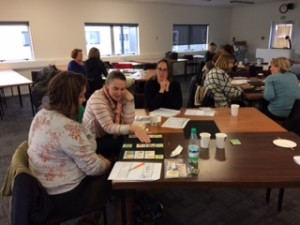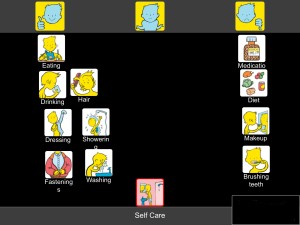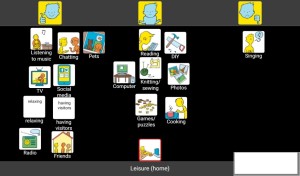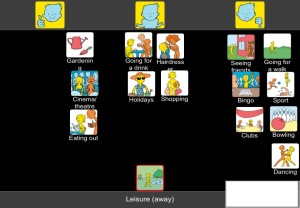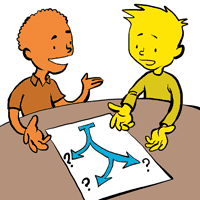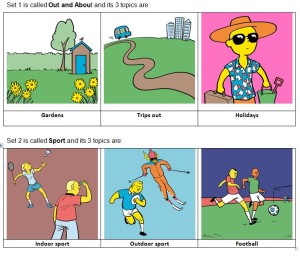Laura Holmes was pleased to meet up with Rachel Clemow, Head Teacher and Donna Wood, Education Support Worker who work for the Virtual Schools Team in Wigan to find out about the impact of Talking Mats training.
Donna accessed a Talking Mats Training last year delivered by a Talking Mats accredited Trainer in Wigan Educational Psychology service and quickly put her training into practice with the children that she works with, using the Consulting Children and Young People – Primary resource pack. Other members of the team soon recognised the potential benefits of introducing this approach themselves, and so, in April 2017, a further 15 members of the Virtual Schools Team received Talking Mats training.
Looked After Children can often struggle to express their thoughts and feelings, often as a result of their situation/ circumstances. This can be further compounded if they also present with speech, language and communication difficulties. There is a higher risk of such difficulties within the LAC population (Cross 1999 ).
Often there are many professionals involved with a Looked After Child, all asking a wide variety of questions, some of which can be highly personal and/or emotive in nature. The team have observed that children will sometimes end up giving answers which they think the listener wants to hear, rather than answers which reflect their true feelings/views – or the child may withdraw from the process entirely. Consequently, it can be very difficult to ensure that the true ‘voice of the child’ is being heard. Sometimes the children themselves struggle to understand what their own feelings are – often the topics and questions can be complex and involve abstract concepts.
Rachel and Donna report that the Talking Mats approach has had a big impact on their communication style when working with the children on their caseloads, and has enabled children to express their thoughts and views in a safe, neutral environment. Some of the comments they made about Talking Mats were that it:
– Enables the listener to get to know a child quicker and more easily as there is no pressure/expectation of the ‘thinker’ – it is a child/’thinker’ led approach.
– Provides way of supporting the child to open up to express their views and feelings, even if they have previously been hard to engage – and for the child to develop better insight into their own feelings.
– Helps to avoid the possibility of adult/listener misinterpretation of what the child is trying to communicate.
– Enables the child to focus on pictures – which appears to result in the child being more comfortable in expressing their own views and feelings – as opposed to what the child thinks the listener wants to hear.
– Provides a holistic view of the child – which can support target setting and planning at key stages for that child, for example, transition to High School.
– Gives the child something they can be successful at – there are no ‘wrong’ answers.
Donna shared a great example of how Talking Mats helped a young girl to describe an issue at home which she had not shared with any carers or school staff previously. The child placed the ‘home’ option symbol on the ‘not happy’ section of the mat then began to whisper to Donna explaining the reason why. This resulted in Donna being able to share the information with school staff and social care, consequently, the issue was resolved.
Services, organisations and schools in Wigan are already using the Talking Mats approach as a result of widespread training delivered by our Accredited trainers in the Educational Psychology Team. This provides a great example of how using Talking Mats across agencies can really help a whole area to become more child/ young person led.
The Virtual Schools team are now recommending the Talking Mats approach to other agencies working with the Looked After Children on their caseloads, such as adoption and fostering services.
If want to access the training then there are Talking Mats foundation courses run regularly in London, Stirling , Manchester and Newcastle . Once you have attended a foundation training and gained experience you can apply to become an accredited trainer .
This is the second blog about Lois and Nicki’s amazing visit to Australasia – this time theirTalking Mats trip to New Zealand.
The view flying into New Zealand was dramatic. We looked down on a beautiful range of snow topped mountains glistening in the clear blue sky as our plane flew towards Christchurch. Our first stop was the South island for a foundation training organised by Talk Link. Our second foundation training was in Auckland in the North Island. At both places we had a fantastic group of interested practitioners who really engaged with how Talking Mats could be used and began thinking creatively about how they would apply in their work place .This included:
• Involving thinkers in decisions about the their alternative and augmentative communication and getting feedback on what works for them
• Exploring its value for young people in the youth justice system to support them to express their views and be a tool for increasing engagement
• Exploring how Talking Mats could be adapted to make them more accessible and culturally accepted to the Maori community
• Involving children in their education planning
We were really pleased that Talk Link also sent 3 staff to the accredited training course in Australia. This means that there will be increased access to Talking Mats Foundation training in New Zealand for the future. Our experience is that accredited trainers provide leadership that helps organisations embed Talking Mats into practice. Thanks to Ann Smaill for all her organising and support for both our Foundation and Accredited courses.
And our leisure times were special too. We had a trip on the Christchurch Gondola to see the stunning Banks peninsula; we experienced the hope and resilience of Christchurch following the earthquakes in 2010 and 2011. In Auckland we saw a thought provoking Maori exhibition and last but not least we loved our weekend of rest and relaxation on the very special island of Waiheke. The locals thought us mad to swim in the sea their autumn but we loved it!
More information
Click for more information if you want to find out about
Five short stories from our recent accredited training course in Stirling.
- A looked after child was unhappy but no one knew specifically why. Using the Talking Mats, she indicated that she was upset by the weekly phone call with her mother because it always happened when it was her playing time. The time of the call was moved to just before her bedtime but this resulted in bad dreams. The time of the call was finally moved to Saturday afternoon which helped her settle and reduced her distress.
- Talking Mats was used with an Iraqi boy who had come to England via Libya, Italy and the jungle camp at Calais. When he picked the symbol of a waiting room he indicated that despite all she had been through he really liked this because it reminded him of all the children in his family and made him happy.
- A 76-year-old man with a learning disability disclosed that he had been attacked and suffocated by his upstairs neighbour one week previously. It was only when he used the Talking Mats that he disclosed to anyone what had happened.
- A lecturer usually used quantifying measuring with her students to find out how they were managing their studies. Instead she used Talking Mats to find out how they were coping with their work life balance. One student told her that she was managing fine except that her pet rabbits always escape under the bed and it takes her a long time to get them back out so she does not let them out very often!
- Talking Mats was used with a man who had had a stroke and had to go into residential care because his family could no longer look after him. They were very worried that he was unhappy with the new care set up. He was able to show with the Talking Mats that he was happy about everything except that he was not given enough time when he went to the toilet. Once the staff realised this they then gave him more time which resolved the situation and reassured his family.
Please send us your Talking Mats stories – we love hearing them.
We’re always amazed to hear from people about the variety of topics they cover using Talking Mats –from how someone is managing their self care or domestic tasks, to arranging a wedding, or thinking about whats important at a funeral.
As a communication tool Talking Mats maximises a person’s capacity to reflect on a topic and express their view. It gives confidence in decision making.
Here are some other topics we’ve heard about recently.
- As a conversation tool in class
- Pupil voice in school improvement plan
- Client contribution to meetings and review day placement
- Respite
- Operations e.g. gastrostomy
- Health
- Postural management
- Where to live
- Childs opinions in relation to GIRFEC
- Respite feedback/choices
- SW assessments
- Choices available within service
- Going somewhere new
- Transitions
- Problem solving ie horse riding, identifying the problem
- Eating and Drinking
- Keeping Safe
- Social Media
What do you want to talk about? There is no limit!
We are now half way through our project, funded by The Health and Social Care ALLIANCE Scotland, whose overall aim is to empower people with a range of long term conditions, with and without additional communication difficulties, to self-manage their own health and well-being by using Digital Talking Mats.
Participants
We have carried out all the initial visits and 16 follow-up visits and participants are sending in their completed mats, choosing whichever topics they want from the digital Health and Well-being resource. At the time of writing this blog we have received 137 completed mats.
We have received very positive feedback with many examples of how people are using the Digital Talking Mats to self-manage.
Here are 3 examples:
One participant with learning disability has diabetes. Through using the Digital Talking Mats she has stopped buying takeaways every night and is now buying M&S ‘Balanced for You’ meals. This is a huge step forward for her as she refused to discuss healthier eating before.
A man with early onset dementia has identified that he used to enjoy singing and has decided for the first time in his life to join a choir. This is not something that had come up in conversation before. Despite the diagnosis of dementia he has realised that he is still keen to try new things.
The wife of a man with severe aphasia said ‘This (Leisure away) has highlighted how few things he can do away from home. We discussed this but can’t see how we can change the situation.’ However at the second visit he used the same mat and indicated that he had been thinking about his mobility and was about to start swimming and a fitness class.
We already have an increased awareness of the meaning of self-management as we observe how participants are using the Digital Talking Mats to think about their situation, state their own views and share them with carers/support workers. We are also noticing that there is a shift in some relationships as the carers/support workers realise that the person with the long term conditions can make decisions and express their own views rather than having decisions made for them.
We are very grateful to Marieke Lindenschot from the Netherlands for this great blog about finding out what activities children like and we look forward to hearing the next stage of her PhD.
For my PhD research in the Netherlands I use Talking Mats as a tool for my interviews with children. The children I interview vary in their communication abilities. Some are able to express their opinions and feelings very well, others are not able to communicate orally. As I was able to purchase the Talking Mats cards without text, I wrote down the words in Dutch in ‘children’s language’ on the cards.
Last week was an exciting week. I conducted the first pilot interviews with a boy of 12 years, a boy of 9 years and a girl of 8 years. They varied in their development. The first interview went great. The child could express which activities he liked, which he disliked and which were ‘so, so’ (in between like and dislike). With Talking Mats he could also tell me with whom he performed the activities and where. It was a fun way to get a lot of information in only 15 minutes! The child and his mother were very enthusiastic. He was able to tell a lot more then he usually does when he is asked about his activities! Unfortunately the other two interviews didn’t produce the same amount of information. The cognitive level of these children seemed too low to use Talking Mats. The boy didn’t understand the top scale ‘like’ and ‘dislike’, whereas the girl didn’t recognize the activities on the cards.
Overall we were very satisfied with these pilot interviews. The goal was to check if the interview guide with Talking Mats ‘worked’ and also to see for which developmental level this way of interviewing is possible. The pilot interviews gave a lot of information on these two goals. I am looking forward to the next interviews as Talking Mats showed to be a very helpful tool in finding out which activities children like.
Please send us any other examples of how you have used Talking Mats.
The Keeping Safe Talking Mat resource provides a structured framework to ask someone ’How’s your life going? It has 3 topics: Your Well-being; Relationships; Thoughts and Feelings
Do you find it difficult discussing feelings with people who have limited understanding?
Do you have limited time to discuss sensitive issues with people?
Do you want to find out any issues which may be slowing recovery or preventing someone moving forward in life?
A cost benefit analysis demonstrated that using the Keeping Safe resource to create a listening space for people to think and share how their lives are going, is cost effective for organisations.
The design of the resource is described in the Tizard Learning Disability Review More Than Pictures TLDR 2017
It has been trialled and tested with people with learning disabilities throughout Scotland, but has also been used effectively with a range of people who find it difficult to discuss their life e.g. Young people with mental health condition.
It has been shown as a helpful way to
- discuss new information (89%),
- discuss and resolve fears (84%)
- support thinking (89%)
This poster gives an overview of the project KS 2nd Poster (click to enlarge)
The Thoughts and Feelings topic uses a different top scale and this resource is best used by people who have completed Talking Mats Foundation Training. If you want to buy it (£55.00 +VAT) contact the office www.talkingmats.com tel. (+44) 01786 479511
Health professionals from Stockport have shared how using Talking Mats has positively impacted on their clinical work.
Laura, our North West Associate, met up with Carla Innes, Clinical Psychologist for learning disability from Healthy Young minds Stockport (a child and adolescent mental health service provided by Pennine Care NHS Foundation Trust) and Clare Royle, Family Support Worker,from the Children’s Learning Disability Team (provided by Stockport NHS Foundation Trust). The two organisations work closely together to provide joined up care to young people with a learning disability.
Six months ago Carla, Clare and seven others from the Healthy Young Minds Stockport Team received training to enable them to introduce Talking Mats as part of their challenging behaviour pathway.
Carla and Claire said that the staff team are very positive about the impact of Talking Mats. The overall impression is that Talking Mats has enabled staff to gain an individualised sense of the child or young person they are working with, as well as empowering the children and young people to share their views and opinions. Carla also notes that using Talking Mats has helped her to focus on the child/young person’s abilities/potential – their ‘zone of proximal development’ – and to ensure that everyone is working within that.
Some of the other positive features of using Talking Mats include:
– Providing ‘headspace’ for the child/young person to process their thoughts and to really consider what is important to them.
– Giving a holistic, child/YP centred account and narrative of their feelings and behaviour.
– Helping to inform and direct clinical decision making e.g. introduction of an approach such as CBT.
– Enabling children/young people who have previously refused, or been very reluctant, to share their views and opinions about topics which have been troubling them for example, school attendance and issues with sleep.
– Providing of a communication framework which is neutral and non-threatening – much less intense than direct verbal questioning or conversation.
– Helping to make abstract concepts more concrete for the listener to understand.
– Being a safe, flexible and quick method of finding practical solutions and determining direct actions.
– Enabling the listener to gain a better understanding of the thinker’s level of knowledge and understanding about a particular topic such as healthy eating. This can help inform capacity assessments e.g. in terms of medical consent or the use of medication. The mental capacity act states that appropriate support should be given to young people to make informed decisions and to communicate those decisions.
In addition, from a wider team perspective, Carla and Clare report that they have all noticed benefits in terms of consistency of Talking Mats use by all members of the multi-disciplinary team. Each team member using the Talking Mats tool is working from a slightly different perspective; using Talking Mats ensures that the child/young person is kept at the centre of the process. This results in a truly holistic view of the child/young person’s feelings, views and opinions.
Conversation with friends is key to our well- being.
Talking Mats is a tool to maximise people’s capacity to communicate about things that matter to them. For people with communication difficulties the ability to have a good conversation is restricted. For this reason we have developed Conversation sets, described in an earlier blog http://www.talkingmats.com/talking-mats-conversation-sets/
The topics include Holidays, Gardens, Trips out, Sport. Football even has one if its own!
Some of the members of the National Involvement Network in Edinburgh tried out the conversation sets. Fiona’s conversation is generally limited to responding to questions and she has a tendency to agree with what other people say. Using the Holidays topic, she told me that she liked camping and added that she had tried this a long time ago when she was a member of the Girl Guides. I told her I had also been camping with the Girl Guides so immediately this created a bond between us. Sharing experiences can be the start of a friendship.
David and James used the Football topic to chat about a recent match they had attended together. Before using the mat to discuss the match they did not know that they had felt differently about the stadium and the crowd. This was a surprise and stimulated further chat. Together they relayed a funny incident that had happened and we all had a good laugh- another aspect of building friendships.
David and James have good conversational skills but the Talking Mat took their conversation to a more detailed level. For people who have difficulty getting involved in conversations these topics allow them to share experiences and find links with other people.
A conversation is an informal interaction, between two or more people, in which news and ideas are exchanged. Having a conversation can be an enjoyable activity for people and is an important part of socialisation but is often hard for people with communication difficulties to take part and hard for families, friends and staff to support these informal conversations as well as finding topics to talk about. We have developed a range of Talking Mats symbol sets called Conversation Topics which can be used by people of all ages and abilities to take part in conversations and have a chat.
These are now available to anyone who has completed a Talking Mats training course.
Each Conversation Set is made up of 3 topics with specially designed symbols. Click on the image to enlarge.
Examples of how this resource has been used during our pilot phase:
Gardens: A resident in a Care Home chatted about what she liked and didn’t like about the Care Home gardens and made some suggestions for changes.
Trips Out: A group of people at a Day Centre planned where they wanted to go for their weekly outings.
Holidays: A young man with a learning disability talked to his social worker about where he had gone on holiday and what he had enjoyed.
Indoor Sports: A woman with a stroke chatted with her friend about the sports she wanted to try at the local Sports Centre.
Outdoor Sports: A man with dementia talked about the sports he used to do when he was younger.
Football: A group of people with learning disability chatted about what they liked and did not like about a football game they watched on TV. This set provoked lots of lively discussion.
Keep a lookout for further sets in the future.
If you have completed a Talking Mats training course and would like to order these sets please contact info@talkingmats.com or phone 01786 479511
Other resources to expand your use of Talking Mats can be found on our website – www.talkingmats.com.
 Online training login
Online training login 

